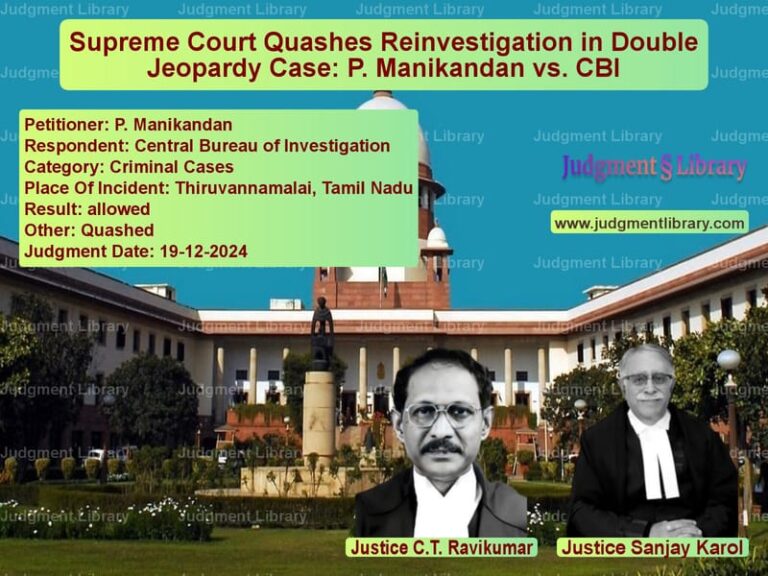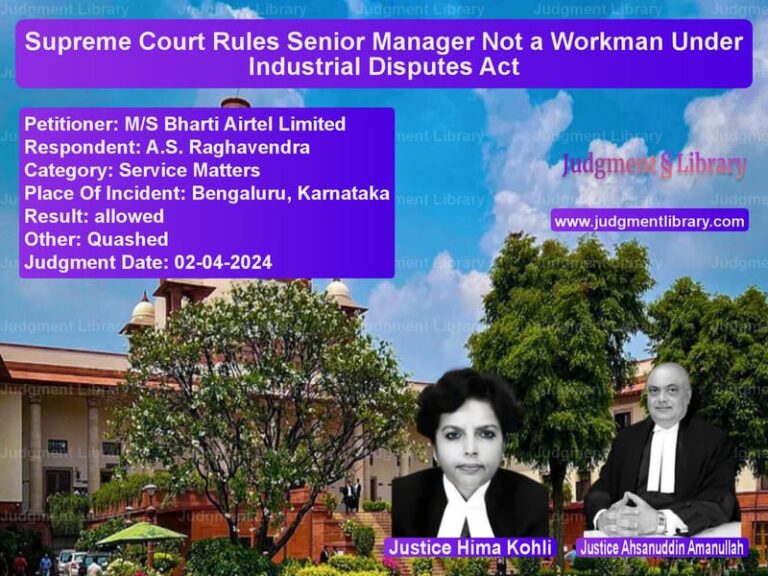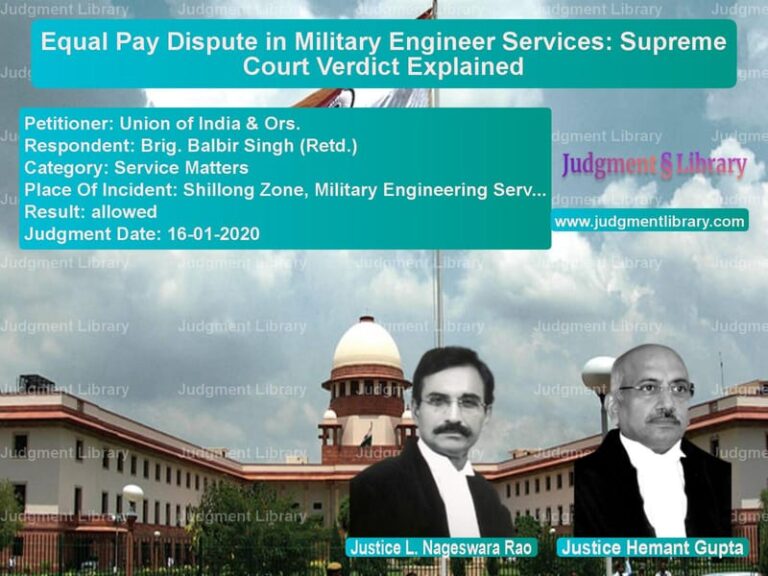Supreme Court Rules on Service Tax Applicability for Banks on Merchant Discount Rate
The Supreme Court of India, in the case of Commissioner of GST and Central Excise v. M/S Citibank N.A., delivered a significant judgment on October 16, 2024, clarifying the applicability of service tax on the Merchant Discount Rate (MDR) in credit card transactions. The Court held that service tax is not separately payable on the interchange fee as service tax has already been paid on the MDR by the acquiring bank. This ruling has major implications for banks, tax authorities, and businesses engaged in digital transactions.
Background of the Case
The dispute arose between the Commissioner of GST and Central Excise (Revenue) and M/S Citibank N.A. regarding the taxation of MDR, which is the fee paid by merchants to banks for processing credit card transactions. The key issue was whether both the acquiring bank and the issuing bank should be liable to pay service tax on different components of the MDR.
Understanding Merchant Discount Rate (MDR)
The MDR is a fee charged by the acquiring bank for processing credit card transactions. It consists of:
- Acquiring Bank Fee: The fee charged by the acquiring bank for handling the transaction.
- Interchange Fee: A portion of the MDR that the acquiring bank pays to the issuing bank.
- Platform Fee: The fee charged for using the credit card network.
The Revenue argued that while the acquiring bank was paying service tax on the MDR, the issuing bank should also pay service tax on the interchange fee it receives. Citibank opposed this, arguing that the service tax had already been paid on the entire MDR, and a separate levy would amount to double taxation.
Petitioner’s Arguments (Revenue)
The tax authorities contended:
- The acquiring bank should pay service tax on the MDR minus the interchange fee.
- The issuing bank should separately pay service tax on the interchange fee.
- As per Section 65(33a) of the Finance Act, 1994, the service tax should apply separately to both banks.
- The interchange fee represents a distinct taxable service provided by the issuing bank to the acquiring bank.
Respondent’s Arguments (Citibank N.A.)
Citibank argued that:
- The service tax had already been paid on the full MDR by the acquiring bank.
- Levying service tax separately on the interchange fee would lead to double taxation.
- The entire credit card transaction process is a single, unified service and should not be artificially split for tax purposes.
- Under Rule 5(1) of the Service Tax (Determination of Value) Rules, 2006, the MDR as a whole should be taxed at the first point of collection.
Supreme Court’s Analysis and Judgment
The Supreme Court, in a three-judge bench comprising Sanjiv Khanna, Sanjay Kumar, and R. Mahadevan, ruled in favor of Citibank and dismissed the appeal by the tax authorities. The Court upheld the reasoning of Justice S. Ravindra Bhat and stated:
Taxing MDR as a Single Service
The Court noted that Section 65(33a) of the Finance Act sought to bring various credit card services into the tax net. However, it held that:
“MDR is charged by the acquiring bank at the first point in time and subsumes both the acquiring bank fee and the interchange fee of the issuing bank, as well as the platform fee. It is the sum total of these charges.”
Read also: https://judgmentlibrary.com/income-tax-appeal-supreme-court-dismisses-case-on-barred-revised-return/
Since the service tax had already been paid on the full MDR at the acquiring bank level, the Court ruled that there was no need for a separate tax on the interchange fee.
Ease of Tax Collection
The Court emphasized the importance of simplicity in tax collection and stated:
“While interpreting a tax provision, one must keep in mind that the legislature ennobles the ease of collection of tax and payment of tax. These principles, especially when there is no loss of revenue, can be taken into consideration for interpreting a provision in case of doubt or debate.”
Double Taxation Concerns
The Court rejected the argument that the issuing bank should pay additional tax, noting:
“The entire amount of service tax payable on the MDR has been paid to the Government and there is no loss of revenue.”
Onus on the Tax Authorities
The Supreme Court criticized the tax authorities for failing to verify whether the full service tax had already been collected. It held:
“The entire data and details are available with the Service Tax Department and could have been easily ascertained before issuance of the show cause notice.”
Key Takeaways from the Judgment
- Clarification on MDR Taxation: Service tax on the MDR should be paid at the acquiring bank level, and there is no separate liability on the issuing bank.
- Prevention of Double Taxation: The judgment prevents banks from being taxed twice on the same transaction.
- Simplification of Taxation Process: The ruling ensures ease of tax collection and compliance for financial institutions.
- Responsibility of Tax Authorities: The judgment emphasizes that tax authorities must conduct thorough verification before issuing tax demands.
Impact of the Judgment
This ruling has significant implications for the banking and financial services industry, particularly for credit card service providers and tax authorities. The key impacts include:
- Reduced Compliance Burden: Banks and financial institutions will benefit from a streamlined tax structure.
- Regulatory Clarity: The ruling provides much-needed clarity on the taxation of MDR and interchange fees.
- Protection Against Arbitrary Taxation: The judgment safeguards businesses against inconsistent tax demands.
- Encouragement for Digital Transactions: A simplified tax structure will promote the growth of cashless transactions.
Conclusion
The Supreme Court’s ruling in Commissioner of GST and Central Excise v. Citibank N.A. is a landmark decision that reinforces fair taxation principles and prevents double taxation. By ensuring that service tax on credit card transactions is paid at a single point, the judgment simplifies compliance for financial institutions while safeguarding government revenue. This ruling will serve as a precedent for future tax disputes involving complex financial transactions and reinforces the need for clarity in tax administration.
Petitioner Name: Commissioner of GST and Central Excise.Respondent Name: M/S Citibank N.A..Judgment By: Justice Sanjiv Khanna, Justice Sanjay Kumar, Justice R. Mahadevan.Place Of Incident: India (Financial Services Taxation).Judgment Date: 16-10-2024.
Don’t miss out on the full details! Download the complete judgment in PDF format below and gain valuable insights instantly!
Download Judgment: commissioner-of-gst-vs-ms-citibank-n.a.-supreme-court-of-india-judgment-dated-16-10-2024.pdf
Directly Download Judgment: Directly download this Judgment
See all petitions in Income Tax Disputes
See all petitions in Banking Regulations
See all petitions in Tax Evasion Cases
See all petitions in Tax Refund Disputes
See all petitions in GST Law
See all petitions in Judgment by Sanjiv Khanna
See all petitions in Judgment by Sanjay Kumar
See all petitions in Judgment by R. Mahadevan
See all petitions in dismissed
See all petitions in Quashed
See all petitions in supreme court of India judgments October 2024
See all petitions in 2024 judgments
See all posts in Taxation and Financial Cases Category
See all allowed petitions in Taxation and Financial Cases Category
See all Dismissed petitions in Taxation and Financial Cases Category
See all partially allowed petitions in Taxation and Financial Cases Category







